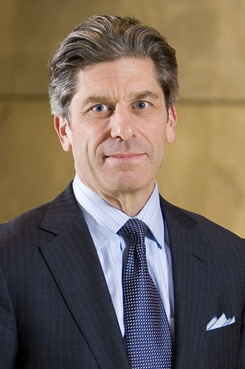Gibson Dunn Fee Petition Highlights DOJ's Switched Position in SCOTUS
"In short, the government dug in its heels all the way to the end, and lost it all," Gibson Dunn said in its fee petition in the D.C. Circuit, where the firm was pro bono in a case challenging the appointment of SEC administrative law judges.
December 14, 2018 at 01:11 PM
5 minute read
The original version of this story was published on National Law Journal
 Gibson Dunn offices in Washington. Credit: Diego M. Radzinschi/ ALM
Gibson Dunn offices in Washington. Credit: Diego M. Radzinschi/ ALM
Gibson, Dunn & Crutcher is asking the U.S. government to pay more than $800,000 in legal fees for a pro bono victory in the U.S. Supreme Court in June. But whether and how much the firm is paid will place new scrutiny of the government's changed position in the case at the high court.
Mark Perry, the lead Gibson Dunn partner in the case Lucia v. SEC, which challenged the constitutionality of how administrative law judges were appointed, on Thursday filed the fee request under the Equal Access to Justice Act in the U.S. Court of Appeals for the D.C. Circuit.
 Mark Perry
Mark Perry“The SEC has for years been violating the constitutional rights of respondents in administrative enforcement proceedings, including other clients of the firm,” Perry said in a statement to The National Law Journal on Friday. “Ensuring that the government adheres to the separation of powers, which protects the liberty of all Americans, is the very definition of pro bono publico.”
In Lucia, a 7-2 high court said administrative law judges at the U.S. Securities and Exchange Commission are “officers” within the meaning of the Constitution's appointments clause and the judge in Raymond Lucia's case at the securities agency was not properly appointed. He was entitled to a new hearing on securities charges before a properly appointed judge, the majority held. The ruling cast some uncertainty over the thousands of administrative law judges serving across the federal bureaucracy, and litigation has ensued over the scope of the court's decision.
The Obama administration's Justice Department in the D.C. Circuit had defended the SEC's view that administrative law judges were not “officers” under the appointments clause. But in the Supreme Court, the Trump administration changed position “upon further consideration” and sided with Lucia.
Under the Equal Access to Justice Act, a “prevailing party” in civil litigation against the federal government is entitled to fees and other expenses unless the court finds that the government's position was “substantially justified.” The government has the burden to show that its position had “a reasonable basis both in law and fact.”
Perry argues the government cannot meet that burden.
Even after telling the Supreme Court that its prior litigating position was wrong, Perry said in Gibson Dunn's fee request, “the government refused to concede that the constitutional violation required a meaningful remedy—asking the Supreme Court, instead, merely to remand for 'further proceedings.' The Supreme Court rejected that position, too, holding that a 'new hearing' before a different adjudicator was required. In short, the government dug in its heels all the way to the end, and lost it all.”
The Justice Department did not immediately comment on the fee request.
Read Gibson Dunn's fee petition here:
[falcon-embed src="embed_1"]
Perry told the D.C. Circuit that Gibson Dunn was seeking fees at the Equal Access to Justice Act's standard hourly rate of $125 plus a cost-of-living adjustment. The cost-of-living adjustment for the Washington area results in claimed hourly rates of $196.32 in 2015, $198.48 in 2016, $200.67 in 2017, and $204.34 in 2018.
Gibson Dunn's fee petition did not reveal the normal hourly rates of the partners and associates who worked on Lucia's case.
The total request amounts to $818,730.80 based on 4,075.4 hours of work. Perry and San Francisco-based partner Marc Fagel, co-chair of the firm's securities enforcement team, were the lead attorneys, billing for 496.6 hours and 105.8 hours, respectively. Eight associates also billed for their hours on the case. Overall, the firm said it dedicated 6,000 hours on Lucia's case since 2015, when the SEC administrative law judge ruled against him. The firm said it took Lucia's case to the D.C. Circuit, and beyond, pro bono.
Perry, co-chairman of the firm's appellate and Supreme Court practice, said in the fee petition that the claimed rate was “substantially lower than his normal billing rate for these services.” Indeed, the NLJ has reported that veteran Supreme Court practitioners generally bill at more than $1,000 an hour.
The total fees requested are significantly lower than fees charged in comparable Supreme Court litigation, Perry said in the petition.
Read more:
Hourly Rates for Top Supreme Court Advocates Revealed in Fee Filing
SCOTUS Vet Saharsky Bolts Gibson Dunn After 1 Year for Mayer Brown
Oracle Uses Supreme Court Ruling to Attack Regulator's Discrimination Claims
Gibson Dunn Posts Record Revenue and Income, Slight Drop in Partner Profits
US Supreme Court Says SEC In-House Judges Are More Than 'Mere Employees'
SCOTUS Picks O'Melveny Partner to Argue in Case Challenging SEC Judges
This content has been archived. It is available through our partners, LexisNexis® and Bloomberg Law.
To view this content, please continue to their sites.
Not a Lexis Subscriber?
Subscribe Now
Not a Bloomberg Law Subscriber?
Subscribe Now
NOT FOR REPRINT
© 2025 ALM Global, LLC, All Rights Reserved. Request academic re-use from www.copyright.com. All other uses, submit a request to [email protected]. For more information visit Asset & Logo Licensing.
You Might Like
View All
An ‘Indiana Jones Moment’: Mayer Brown’s John Nadolenco and Kelly Kramer on the 10-Year Legal Saga of the Bahia Emerald


Travis Lenkner Returns to Burford Capital With an Eye on Future Growth Opportunities

Legal Speak's 'Sidebar With Saul' Part V: Strange Days of Trump Trial Culminate in Historic Verdict
1 minute readTrending Stories
- 1How ‘Bilateral Tapping’ Can Help with Stress and Anxiety
- 2How Law Firms Can Make Business Services a Performance Champion
- 3'Digital Mindset': Hogan Lovells' New Global Managing Partner for Digitalization
- 4Silk Road Founder Ross Ulbricht Has New York Sentence Pardoned by Trump
- 5Settlement Allows Spouses of U.S. Citizens to Reopen Removal Proceedings
Who Got The Work
J. Brugh Lower of Gibbons has entered an appearance for industrial equipment supplier Devco Corporation in a pending trademark infringement lawsuit. The suit, accusing the defendant of selling knock-off Graco products, was filed Dec. 18 in New Jersey District Court by Rivkin Radler on behalf of Graco Inc. and Graco Minnesota. The case, assigned to U.S. District Judge Zahid N. Quraishi, is 3:24-cv-11294, Graco Inc. et al v. Devco Corporation.
Who Got The Work
Rebecca Maller-Stein and Kent A. Yalowitz of Arnold & Porter Kaye Scholer have entered their appearances for Hanaco Venture Capital and its executives, Lior Prosor and David Frankel, in a pending securities lawsuit. The action, filed on Dec. 24 in New York Southern District Court by Zell, Aron & Co. on behalf of Goldeneye Advisors, accuses the defendants of negligently and fraudulently managing the plaintiff's $1 million investment. The case, assigned to U.S. District Judge Vernon S. Broderick, is 1:24-cv-09918, Goldeneye Advisors, LLC v. Hanaco Venture Capital, Ltd. et al.
Who Got The Work
Attorneys from A&O Shearman has stepped in as defense counsel for Toronto-Dominion Bank and other defendants in a pending securities class action. The suit, filed Dec. 11 in New York Southern District Court by Bleichmar Fonti & Auld, accuses the defendants of concealing the bank's 'pervasive' deficiencies in regards to its compliance with the Bank Secrecy Act and the quality of its anti-money laundering controls. The case, assigned to U.S. District Judge Arun Subramanian, is 1:24-cv-09445, Gonzalez v. The Toronto-Dominion Bank et al.
Who Got The Work
Crown Castle International, a Pennsylvania company providing shared communications infrastructure, has turned to Luke D. Wolf of Gordon Rees Scully Mansukhani to fend off a pending breach-of-contract lawsuit. The court action, filed Nov. 25 in Michigan Eastern District Court by Hooper Hathaway PC on behalf of The Town Residences LLC, accuses Crown Castle of failing to transfer approximately $30,000 in utility payments from T-Mobile in breach of a roof-top lease and assignment agreement. The case, assigned to U.S. District Judge Susan K. Declercq, is 2:24-cv-13131, The Town Residences LLC v. T-Mobile US, Inc. et al.
Who Got The Work
Wilfred P. Coronato and Daniel M. Schwartz of McCarter & English have stepped in as defense counsel to Electrolux Home Products Inc. in a pending product liability lawsuit. The court action, filed Nov. 26 in New York Eastern District Court by Poulos Lopiccolo PC and Nagel Rice LLP on behalf of David Stern, alleges that the defendant's refrigerators’ drawers and shelving repeatedly break and fall apart within months after purchase. The case, assigned to U.S. District Judge Joan M. Azrack, is 2:24-cv-08204, Stern v. Electrolux Home Products, Inc.
Featured Firms
Law Offices of Gary Martin Hays & Associates, P.C.
(470) 294-1674
Law Offices of Mark E. Salomone
(857) 444-6468
Smith & Hassler
(713) 739-1250






